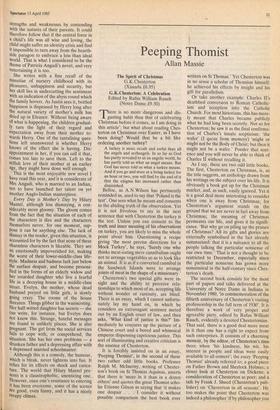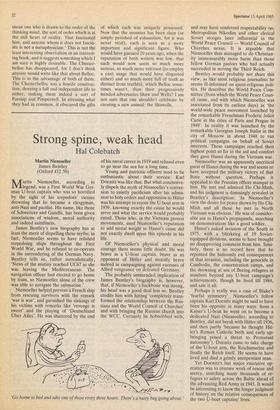Peeping Thomist
Allan Massie
The Spirit of Christmas G.K.Chesterton (Xanadu £6.95) G.K.Chesterton: A Celebration Edited by Rufus William Rauch (Notre Dame £9.50)
'There is no more dangerous and dis- gusting gusting habit than that of celebrating
Christmas before it comes, as I am doing in this article'; but what about reading Ches- terton on Christmas over Easter, as I have been doing? Would that be a bit like ordering another turkey?
A turkey is morc occult and awful than all the angels and archangels. In so far as God has partly revealed to us an angelic world, he has partly told us what an angel means. But God has never told us what a turkey means. And if you go and stare at a living turkey for an hour or two, you will find by the end of it that the enigma has increased rather than diminished.
Belloc, as A.N.Wilson has pertinently reminded us, used to say that 'Poland is the test'. One sees what he means and consents to the abiding truth of the observation. Yet it is not frivolous to say in the next sentence that with Chesterton the turkey is the test. Unless you can consent to the truth and inner meaning of his observations on turkey, you are likely to miss the whole point about him. Questioning a recipe giving 'the most precise directions for a Mock Turkey', he says, 'Surely one who thinks meat-eating mere cannibalism ought not to arrange vegetables so as to look like an animal. It is as if a converted cannibal in the Sandwich Islands were to arrange joints of meat in the shape of a missionary.'
Chesterton's two special gifts were in- sight and the ability td perceive rela- tionships to which most of us, accepting life without wonder or curiosity, are blind. There is an essay, which I cannot unfortu- nately lay my hand on, in which he considers an extravagant sentence meted out by an English court of law, and then asks, 'What kind of justice is this?' Im- mediately he conjures up the picture of a Chinese court and a bored and whimsical emperor dispensing capricious justice. This sort of illuminating and creative criticism is the essence of Chesterton.
It is forcibly insisted on in an essay, 'Peeping Thomist', in the second of these two rather odd little books. Professor Ralph M. McInetny, writing of Chester- ton's book on St Thomas Aquinas, asserts that there is 'more in it than in a dozen others' and quotes the great Thomist scho- lar Etienne Gilson as saying that 'it makes one despair . . . I consider it without possible comparison the best book ever written on St Thomas.' Yet Chesterton was in no sense a scholar of Thomism himself; he achieved his effects by insight and his gift for parallelism.
Or take another example: Charles II's deathbed conversion to Roman Catholic- ism and reception into the Catholic Church. For most historians, this has mere- ly meant that Charles became publicly what he had long been secretly. Not so for Chesterton; he saw it as the final confirma- tion of Charles's innate scepticism: 'the wafer' (I quote from memory) 'might or might not be the Body of Christ; but then it might not be a wafer.' Ponder that sent- ence and you will never be able to think of Charles II without recalling it.
As I say, these are two odd little books. The first, Chesterton on Christmas, is, as the title suggests, an anthology drawn from his writings on the subject over his life. It is obviously a book got up for the Christmas market, and, as such, easily ignored. Yet it is a good deal more interesting to consider when one is away from Christmas; for Chesterton's argument stands on the ground that we are never in fact away from Christmas; the meaning of Christmas permeates our life, and gives it its signifi- cance. 'But why go on piling up the praises of Christmas? All its gifts and glories are externally symbolised in the fact already summarised: that it is a nuisance to all the people talking the particular nonsense of our own time.' That is not a thought to be restricted to December, especially since the particular nonsense has grown more nonsensical in the half-century since Ches- terton's death.
The second book consists for the thost part of papers and talks delivered at the University of Notre Dame in Indiana in November 1980, 'in commemoration of the fiftieth anniversary of Chesterton's visiting professorship in the full term of 1930'. It is therefore a work of very proper and agreeable piety, edited by Rufus William Rauch, evidently a devoted Chestertonian. That said, there is a good deal more meat in it than one has a right to expect from such enterprises. It consists of a charming memoir, by the editor, of Chesterton's time there when 'his kindness, his wit, his interest in people and ideas were easily available to all corners'; the essay 'Peeping Thomist' already referred to; a good piece on Father Brown and Sherlock Holmes; a closer look at Chesterton on Dickens; a consideration of Chesterton as poet; and a talk by Frank J. Sheed (Chesterton's pub- lisher) on 'Chesterton in all seasons'. He too makes the point that Chesterton was indeed a philosopher 'if by philosopher you mean one who is drawn to the order of the thinking mind, the sort of order which is at the still heart of reality. That fascinated him, and anyone whom it does not fascin- ate is not a metaphysician.' This is not the least interesting observation in an interest- ing book, and it suggests something which I am sure is highly desirable. The Chester- belloc has disappeared, for I don't think anyone would write like that about Belloc. This is to the advantage of both of them. The Chesterbelloc was a hostile construc- tion, denying a full and independent life to either, making them indeed a sort of Parsnip and Pimpernell. In stressing what they had in common, it obscured the gifts of wliich each was uniquely possessed. Now that the monster has been slain (or simply perished of exhaustion, for it was never vital), each is seen as a more important and significant figure. Who would have guessed 20 years ago, when the reputation of both writers was low, that each would now seem so much more serious, so much more relevant (to employ a cant usage that would have disgusted either) and so much more full of truth as distinct from truthful, which Belloc some- times wasn't, than their progressively minded adversaries Shaw and Wells? I am not sure that one shouldn't celebrate by creating a new animal: the Shawells.















































 Previous page
Previous page